- Home
- Phillip Tomasso
Johnny Blade Page 7
Johnny Blade Read online
Page 7
“Sir,” the judge had said, holding up his hand. “You need to ask one question at a time, and then allow the witness to answer the question. All right?”
“Sorry, your Honor,” Wringer had said.
The judge had said, “I think Mr. Wringer’s first question asked if you had a problem with him. Can you answer that, Mr. Engler?”
“I never had a problem with Martin. He’s always done good work. He never caused any trouble before. We work in a high-stress area, as I testified to. Our operation runs twenty-four, seven. We don’t even shut down for holidays. But no, I’ve never had a problem with Martin,” Engler responded.
“That’s bullshit,” Wringer had said.
“Mr. Wringer,” the judge had warned.
“Sorry, your Honor. Can I ask another question? Why were you always taunting me at work and harassing me? I can’t remember a shift where you didn’t—”
“Mr. Wringer, one question at a time, please.”
“Sorry, your Honor.”
Stan Engler had stared at Wringer. “Martin, I never taunted you. I can’t honestly figure out what you’re talking about.”
“Can you be more specific, Mr. Wringer?” the judge had asked.
“Specific? How?”
“Can you tell us a specific instance where you believe you were taunted by your supervisor?” The judge had said, clarifying his question.
Martin Wringer had sat quietly, thinking.
“Mr. Wringer?” the judge had prompted.
“I can’t think of anything off the top of my head. I feel like I’m being put on the spot here.” He had cupped his hands over his face. “The night we argued—”
“Which night was that, Mr. Wringer?” the judge had asked.
“The last night I was there, the night of the fight,” Wringer had said.
“Continue.”
“That night we argued, didn’t you call me a drunk?”
“I said that I thought you smelled of alcohol. I did not call you a drunk.”
“Didn’t you mean to imply that you thought I was a drunk?”
“No.”
“But it is what you were thinking, wasn’t it?”
The judge said, “Mr. Wringer, I don’t see—”
“Sorry, your Honor. After you said I was a drunk,” Wringer had said.
“Objection,” Kathleen Parsons had said.
“Sustained,” the judge had agreed. “Mr. Wringer, the witness has already testified to the fact that he did not call you a drunk.”
“Sorry, your Honor. You said, when the judge was questioning you, that I smelled of alcohol. You said that you wanted me to go to medical and submit a blood and urine sample. You wanted to prove that I was unfit for work. Why?”
“We work with chemicals, Martin. If your judgment is even slightly impaired by drugs or alcohol—”
“Objection,” Martin Wringer had said. “No one has mentioned drugs before.”
“I believe a point is being made, and that no one is accusing you of drug usage at this point, Mr. Wringer,” the judge said.
“Oh. Sure. Sorry, your Honor.”
“As you were saying,” the judge had said to the supervisor.
“If your judgment is even slightly impaired by any substance, then there are safety hazards that need to be considered. Not just your own safety, but the safety of those working around you—and to the community,” Engler had said. “When I asked for you to come with me to medical for testing, it was because I needed to be sure you were fit to work.”
“Any more questions?” the judge had asked.
“Yes, your Honor,” Wringer had said through clenched teeth. “How’d it feel when I slammed my fist into your face?”
The judge took testimony from Martin Wringer next. Like before, the judge took the liberty of asking questions first, before turning lose Manson’s representative.
“Mr. Wringer, when your supervisor asked you to go to medical for a fit for work test, what did you say to him?” Parsons had asked.
“I don’t remember.”
“Did you tell him to screw himself?”
“I don’t remember.”
“Did you tell him to go to hell?”
“I don’t remember.”
“Do you remember punching him in the nose?”
“Clearly.”
“When you broke your supervisor’s nose, did you think you might risk losing your job?”
“I guess.”
“Did you remember thinking you might lose your job if you punched him—before you actually threw the punch?”
“I can’t remember. I don’t think so. It was a heat of the moment thing.”
“Heat of the moment? Can you tell me what your supervisor might have said to you that caused you to assault him?” she had asked.
“He called me an alcoholic.”
“Objection,” she had said.
“Sustained,” the judge had agreed. “Your former supervisor has already testified that he did not call you an alcoholic.”
“Yeah, well, I remember him calling me one.”
“And that has been noted,” the judge said.
“Did your supervisor ask if you had a problem?”
“No.”
“Did he ask you if you needed help?”
“No.”
“Your supervisor testified that he wanted to help you, to get you into a program where you could—”
“The hell he did,” Wringer had shouted.
“Mr. Wringer, please control your language, and those outbursts, or I will close this hearing immediately,” the judge had said.
“Sorry, your Honor.”
Kathleen Parsons had spent the next fifteen minutes introducing documents into evidence, for the record. They were company policies on behavior and treatment of others. She even submitted the company’s handbook, indicating sections where it explicitly explained the penalties for violence in the work place. Each document had an annual date and Wringer’s signature, proving that he was well acquainted with company rules and policies.
“No further questions,” Parsons had said.
The judge allowed for the woman to make a closing statement on Manson’s behalf. “Your Honor, the claimant knew, or should have known, that striking his supervisor would cost him his job. Credible evidence clearly establishes the fact that the claimant was aware, or should have been aware of company rules and policies that prohibit workplace violence. The claimant was terminated for reasons of misconduct and should be deemed ineligible to receive benefits. Thank you, your Honor.”
Wringer had declined to make a closing statement. He saw no point. The company screwed him. He lost his job. He lost this hearing. In his mind, little else could go wrong to make matters worse.
Wringer, the first out of the hearing, had ignored the people in the waiting room and headed for the elevators.
When at last the rep, his ex-supervisor and the man in the shirt and tie appeared, Wringer stood ready for them. The tension had built inside him. He could not keep his fingers unrolled. It felt as if the tips were bound to his palms—indefinitely clenched in a fist.
“Did you enjoy that, bastards,” Wringer said, speaking to her, to him, to all three of them. “Making me look like an ignorant jerk? If that judge denies me checks, how in the hell am I supposed to support my family? Have any idea how I’m supposed to do that?”
“You should have thought—”
The man in the shirt and tie had stopped Stan Engler from talking. “Mr. Wringer, please turn around and proceed to your car.”
“And who the hell are you?”
“Please, Mr. Wringer.” The man had his arms bent, keeping his hands non-threateningly in front of his chest.
Wringer had recognized the defensive stance. “You’re a cop? Corporate security, or something?”
“I’m with the company, yes. Now please, go to your car.”
“Freaking undercover security. I’m not dangerous, assholes. Do I look danger
ous?” Wringer had asked, staring at Engler, whose skin around the nose and under the eyes was still dark and bruised looking. Frustrated, Wringer turned and walked away.
Wringer had then gone to the doctor’s appointment, despite his pissy mood. After the doctor examined him, and after some blood work, the doctor told Wringer that he had a venereal disease. Wringer could remember the embarrassment he felt. He had known right away how he had contracted the disease. There really was no surprise.
“You’re going to need to tell your wife,” the doctor had explained.
“Of course,” Wringer agreed. He had no intention of telling her. He could not remember the last time they had been intimate—not since him losing his job. His encounter with the disease-infected whore came after losing his job.
When he arrived home late that afternoon, however, he was appalled to learn his doctor had called home to let his wife know that he had contacted the pharmacy about a prescription, completely destroying the confidentiality of a doctor-patient relationship. Wringer felt certain the act was illegal, too. When someone can’t trust his or her own doctor—what does that tell you about society? Wringer thought, bitterly.
And his wife played it cool, too, before she had let on “How was the hearing? How was the doctor’s appointment? When were you going to tell me you’d been screwing a prostitute? Get out of my house! Get the hell out of my house you sick, perverted asshole!”
Casey, the whore, had deserved to die. She had ruined his life.
Chapter 16
Michael Buzzelli spent the rest of the day at home, writing. He set up columns in the spreadsheet on his computer. He put the name of each person as a header over each column. Under each column, a cell per item, he listed what he knew about them. He started everyone off with a description. He recounted the events of the previous night, and wrote many things under ‘Marcus’ The last thing he entered was the story Speed relayed to him about shopping for a birthday gift for his father.
In a Word document, Michael took careful time to document his narrative, recapturing his own thoughts and emotions. He wanted the reader to be able to see all that he saw, without overdoing the descriptions. He wanted readers to enjoy the crisp dialogue that he listened to, without having it sound contrived. Less is more.
Before going in to work Sunday night, and despite feeling completely rejuvenated and freshly inspired, Michael knew he needed to consider his work at Jack’s like an assignment and not as a second job.
Upon arriving, Murphy and he discussed in the back room what took place at the police station. “I told them the truth, Murphy. I told them I was pretty sure it was the two young guys in here the other day, but because they were wearing masks . . .”
“I understand. Don’t worry about it. I’d have done the same thing,” Murphy said. “Besides, they didn’t get the money.”
Was that all? They did not get the money. Michael thought about how close the one thug had come to pistol whipping Sandy. The creeps had aimed guns at all the customers. Anyone could have been hurt, or killed. Murphy seemed content knowing the money was recovered, though, and Michael was not here to argue. Not to mention, no one was hurt. What else should Murphy say? There was nothing more that Murphy could do.
When Murphy left, Michael attempted to settle back into a routine. He tied on his apron and lit up a cigarette before even going out into the dining area.
As though he had never left, Fatso sat at the counter reading through his paper. Sandy was on the payphone in back. Marcus was not around, but his booth sat empty as if waiting for him to show. There were many more people in the room, eating, drinking coffee, all of them talking. The loud murmur of conversation felt calming and Michael could not ignore the sense of peace that overcame him.
When Sandy hung up the telephone she approached Michael. “You see Vanessa last night at all?”
“No, why?”
“She hasn’t been around since Friday, and I’ve been calling her at home, but no one’s answering,” Sandy said. “No big deal. If she comes in, and I’m out, tell her to get in touch with me. Will you do that for me?”
“No problem,” Michael said. A question for Sandy burned inside. He wanted to ask her if she had seen Felicia. He bit his lip, and tucked the question away.
As the night wore on, Felicia did not show. Michael wondered where she might be. He found himself trapped talking with Fatso. He did not mind listening to the man, except that tonight he felt highly distracted.
Where might Felicia be?
Chapter 17
Monday, January 14
Michael drove along Ridge Road on his way to Tantalo’s, a wonderful Italian restaurant in the suburban town of Greece, a few miles west of The Mall at Greece Ridge Center. Traffic at any given time felt dense on Ridge Road. Drivers in the area seemed to enjoy riding the ass of the car in front of them. Keeping his road-rage temper in check, Michael refrained from honking his horn when the driver next to him changed lanes in front of him without using a directional signal.
He pulled into the parking lot, saw Ellen’s car, and parked as close to it as he could. When he walked in and did not see Ellen, he knew she already had a table. He checked his watch to make sure he was not late—and he was not—before looking around the restaurant.
“Can I help you, sir?” The hostess asked.
“I’m here to meet a friend. She might already have a table.”
“And your name, sir?”
“Michael Buzzelli,” he said.
“Your friend is at the bar, right around this corner,” the hostess said.
Michael thanked the young lady and made his way to the bar. He took off his gloves and stuffed them into his coat pockets. He shrugged out of his coat and hung it over the back of an empty, black leather seat next to Ellen at the bar. “What’s a pretty thing like you doing all alone in a place like this?”
“Starving,” Ellen answered. She leaned over, and they kissed. Michael tasted sweet liqueur on her lips, smelled it on her breath.
“Fuzzy navel?”
“Hairy back,” Ellen retorted, giggling.
Michael could not help but laugh. He pulled out his cigarettes as the barmaid asked him for his order. “Brandy, please.”
“Brandy?” Ellen asked.
“I’m frozen. My fingers are numb. I spent fifteen minutes scraping snow and ice off the windows. Then the heater in the car finally starts working just now, as I pulled into the parking lot. A brandy sounds like it will warm me,” Michael said.
“How was work?”
“It was slow last night. More quiet than it’s been the last two nights,” Michael said, lighting a cigarette. Tantalo’s allowed smoking at the bar, because it was an isolated room with a separate ventilation system. There were a few tables for people to sit and eat while they drank and smoked. Those tables were hard to get. Reservations in advance would be helpful. Ellen did not smoke. Michael knew she would have reserved a table in the non-smoking section of the restaurant.
“I don’t mean at the dive, I mean at the paper,” Ellen said.
Michael shrugged. “It was dull. I typed out some obituaries and did some leg work for one of the journalists.”
“That sounds exciting,” Ellen said, flatly.
“Writing obituaries, or doing research for a journalist who plans on taking all the credit for the article he’s writing?” Michael asked. He thanked the barmaid for his drink and took a good, long sip. The brandy was strong and definitely seemed to burn going down his throat. He felt it burn in his belly and longed for a beer. It was too late to order a beer. He had already made an ordeal out of having a brandy. Even the barmaid had flashed him an odd look when he ordered.
“You only just started with them, Michael,” Ellen said, placing a hand on his shoulder.
It should have felt comforting having her words and her hand reaching out to touch him, but it did not. He took another sip of brandy. “I graduated from college with a three point seven G.P.A. I was editor of the sch
ool’s paper. I covered news breaking stories on campus—some that were even recognized by the City Chronicle.”
“And those things are what got you a job at the paper,” Ellen was quick to point out. It was also easy for her to say. Everything came easy for her. She graduated at the top of her class and landed a job with a medium-sized, Rochester based, law firm three weeks after graduation. “Honey, this is a different world—completely different from the one you knew in college. Competition is fierce in school, but quadruple that, and you’ll see what it’s like outside of school. I’ve got to think that reporter jobs on the City Chronicle don’t open up very often. Those writers are part of the union.”
“And so am I,” Michael said. He knew he sounded like a baby. He felt like he was whining, but he did not bring up the topic. “Can we talk about something else?”
“Sure, how about the menu? I really am hungry.”
After the hostess led them to their table, the waitress appeared to take their orders. “Can I get the Surf-n-Turf, only with twin tails? And another one of these?” Ellen asked, pointing to the full Fuzzy Navel she had brought over from the bar.
Michael cringed at her order. The last time they went Dutch treat, Michael was still in school earning his degree in journalism. He wondered what would possess her to order such an expensive item from the menu. Sure he was working at the paper, and the second job was extra income, but he had rent to pay, and student loans rolling in. Also, she seemed a little gone already. Michael knew this could not be her second drink. He wondered if the alcohol was clouding her judgment. He wondered how she planned to get her car home. Maybe she would get drunk enough and pay for the entire meal.
“And for you?” the waitress asked Michael.
“Actually, Linguini and clams in a red sauce sounds wonderful,” Michael said.
“And to drink?”
He wanted a glass of wine, but thought better of it after the brandy fiasco. “A beer. Whatever you have on tap will be fine.”
After the waitress took their orders, Michael apologized. “I’m sorry I snapped at you over at the bar. I’m a little stressed out.”

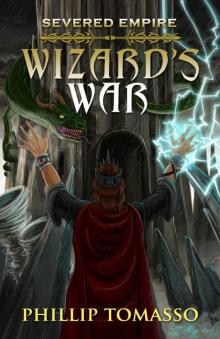 Severed Empire: Wizard's War
Severed Empire: Wizard's War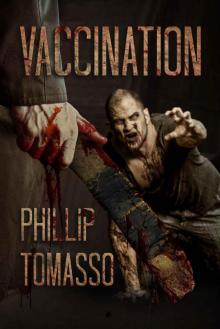 Vaccination - 01
Vaccination - 01 Extinction
Extinction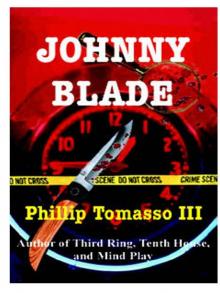 Johnny Blade
Johnny Blade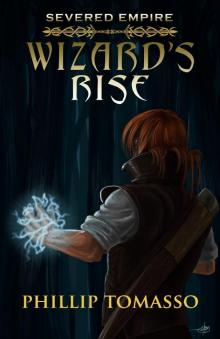 Severed Empire: Wizard's Rise
Severed Empire: Wizard's Rise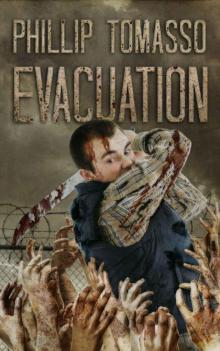 Evacuation - 02
Evacuation - 02 Absolute Zero
Absolute Zero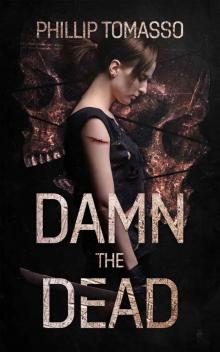 Arcadia (Book 1): Damn The Dead
Arcadia (Book 1): Damn The Dead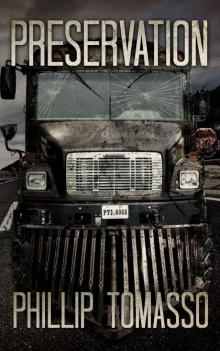 Preservation - 03
Preservation - 03